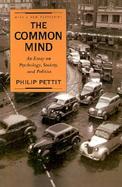The Common Mind an Essay on Psychology, Society and Politics
- Binding: Paperback
- Publisher: Oxford Univ Pr on Demand
- Publish date: 04/01/1996
Description:
What makes human beings intentional and thinking subjects? How does their intentionality and thought connect with their social nature and their communal experience? How do the answers to these questions shape legitimate assumptions in social explanation and political evaluation? In this innovative study, Philip Pettit addresses these broad-ranging issues and defends a connected set of responses. The book argues for an original way of distinguishing thinking subjects, in particular human beings, from other intentional systems, natural and artificial. It defends the holistic view that human thought requires communal resources while denying that this social connection compromises the autonomy of individuals. And, in developing the significance of this view of social subjects - this holistic individualism - it outlines a novel framework for social and political theory. Within this framework, social theory is allowed to follow a number of paths: Space is found for intentional interpretation and decision-theoretic reconstruction as well as for structural explanation and rational choice derivation. But political theory is treated less ecumenically. The framework raises serious questions about contractarian and atomistic modes of thought and it points the way to a republican rethinking of liberal commitments. Designed to be accessible to readers in a number of disciplines and on the student as well as professional level, The Common Mind will interest philosophers as well as political scientists, economists, sociologists, cognitive scientists, and scholars of law.
Expand description

Please Wait

